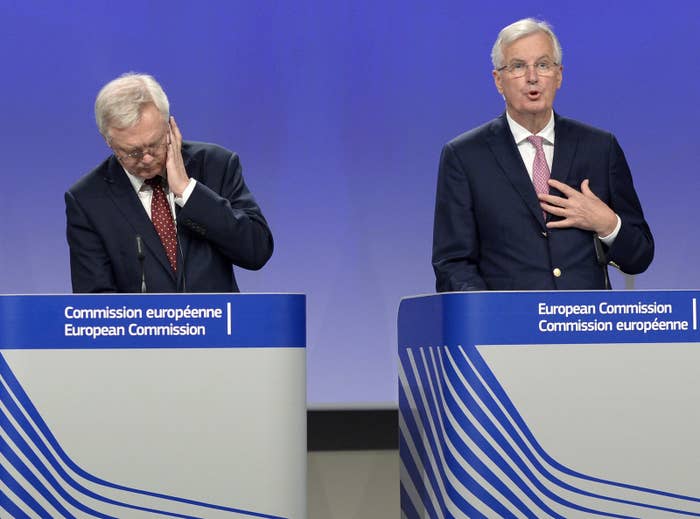
Britain will need to clarify its position on the UK’s financial commitments towards the European Union if Brexit negotiations are to progress, the EU’s chief Brexit negotiator Michel Barnier has warned.
Barnier's statement came after recent comments by UK foreign secretary Boris Johnson, who said EU negotiators could "go whistle" if they expected Britain to pay an "extortionate" bill when the UK left the union.
Speaking at a press conference in Brussels alongside Brexit secretary David Davis at the end of the second round of talks, Barnier said: “The United Kingdom recognized last week the existence of its obligations vis-à-vis to the union after the date of withdrawal, and the need to settle these commitments."
He went on: “As I said very clearly to David, a clarification of the United Kingdom's position is essential to negotiate and to achieve sufficient progress on this financial dossier, which is inseparable from the other withdrawal dossiers."
Asked about Johnson's comments, Davis noted the foreign secretary’s use of the term "extortionate".
Dozens of EU and UK negotiators spent this week’s talks in working groups going through presentations of each side’s respective positions on the set of issues they agreed last month would constitute the first phase of talks: citizens’ rights, financial settlement, and "other separation issues", as well as an ongoing dialogue to find a solution to the potential Ireland–Northern Ireland border issue.
Although Barnier said he was pleased with the detailed offer put forward by the UK in regard to the rights of EU citizens, he underlined a number of times during the press conference the lack of a clear British position on other key issues.
"We make better progress when our positions are clear," Barnier said.
EU side irritated by lack of detail from UK, especially on divorce bill. 'We make better progress when our positions are clear,' Barnier.
The EU published its position on the so-called Brexit bill at the end of May. It states that the two sides need to agree on a method to calculate Britain’s dues – and not an exact amount – before talks can move on to a second phase. The UK government has yet to spell out its position in detail.
Davis said: “We both recognise the importance of sorting out the obligations we have to one another, both legally, and in the spirit of mutual cooperation.
"We have had robust but constructive talks this week. Clearly there is a lot left to talk about and further work before we can resolve this. Ultimately, getting to a solution will require flexibility from both sides.”
Answering questions from reporters, the Brexit minister reaffirmed that the UK had always been clear about recognising its international obligations, responsibilities, and rights.

The four days of talks focused mostly on identifying points where the two sides agreed and where they disagreed, Barnier said.
Although both Davis and Barnier noted that there were areas of agreement on EU citizens’ rights, “fundamental” differences remain between the two parties over how to guarantee their rights after Britain leaves the EU in 2019, the EU’s chief negotiator said.
The EU remains firm that the European Court of Justice (ECJ) needs to have a role in guaranteeing these rights.
“Citizens must be able to find through the withdrawal agreement itself the legal certainty they need in their daily lives," Barnier said.
"Frankly, on our side, we see no other way to guarantee the durability of these European rights exercised. And of course, any reference to EU rights implies its control by the ECJ."
Barnier said the EU's insistence on the role of the ECJ was not a political point but a legal one, because only the ECJ could have oversight over EU law. "If there is to be continuity of EU law, it has to be framed by European court case law," Barnier told a reporter, adding that the EU wanted citizens to continue to enjoy the full suite of existing rights.
Davis said the UK also wanted to provide certainty to citizens but the two sides disagreed over how to do this. Ending the jurisdiction of the ECJ is one the red lines set out by the UK.
The Brexit minister also announced that the UK and the EU had agreed to publish a joint paper that "sets out the many areas of convergence in our proposals, and the areas we need to prioritise for future discussion in our future rounds".
The EU is hoping for greater clarity from the UK on other aspects of the British position, including the rights of future family members, exporting benefits, and the rights of posted workers.
These issues of divergence will be the focus of the next round of talks, scheduled to take place in the week commencing 28 August.
“The first round was about organisation, the second was about presentation, and the next must be about clarification,” Barnier said.
